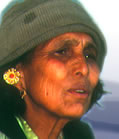THEMES IN THIS
TESTIMONY
Communications

Conflict

Development

Education

Justice and crime

Politics

Click on arrows
to find more
testimonies
featuring
these themes
|
|
Sex
|
Female
|
|
|
Age
|
29
|
|
|
Identity
|
Gurung
|
|
|
Occupation
|
news vendor
|
|
|
Location
|
Lamjung district
|
|
|
Date
|
2002
|
|
summary
The narrator, who wishes to remain anonymous, talks in detail about the Maoists and how the conflict has affected her personally. She offers an insight into the way in which being caught in the middle between rebels and the army can divide family and community. Her sister-in-law was shot by police after being arrested following a public meeting in the village, while one of her brothers, despite having Maoist sympathies, had his feet cut off by the rebels. She comments “the practice of killing from both sides is not good”. She paints a bleak picture of brutal retribution by everyone: “Both sides are going around killing or being killed.”
She draws attention to some of the wider impacts of the Maoist activities – and police reactions to them. Deep distrust of the authorities was created in a previously Congress-supporting community, as villagers witnessed the police luring in local people by disguising themselves as rebels, before cordoning off the area and opening fire on those who panicked and tried to escape. The community’s anger was heightened by the inaccurate portrayal of the event in the national news. She also comments on the way in which the activities of both sides have affected everyday life, and all but destroyed local prospects for development. In her own village, a respected local teacher was killed. She explains: “Life is not easy and secure in the hills like before… Development in the village has ceased totally. Now due to the Maoist problem we have not been able to take our harvested paddy to the market in Lamjung to sell…Now this is no situation in which to stay in the village … The poor and ordinary people that stay there do so under constant fear from both Maoists and the army…who are in a position to run away have already run away. Now the poor are still staying. In the end, the ones who suffer are the poor.” People are so weary of being harassed on all sides, she says, that “they’ve reached a point where they say they will not go to give votes to anyone.” She also talks of how her own brothers have been affected, and implies that such is the level of violence and confusion that sometimes personal feuds are carried out under cover of political action.
She has two young daughters and since the escalation of the troubles has left her mountain home for rented accommodation in Chitwan. She is not unsympathetic to some of the Maoists’ ideas, and clearly tries to see both sides of the story where she can, which makes her despair at the situation and the loss and turmoil her own family has suffered even more striking.
detailed breakdown
|
You will need a password from Panos to view the full
transcript of the interview. To apply for a password, click here.
Once you have a password, click here to go to the beginning
of the transcript. You can also click on any section of the
breakdown of content below and go straight to the
corresponding part of the transcript.
|
| Section 1 |
She normally lives with her in-laws in B***, and is the eldest daughter-in-law. One of her brothers-in-law is in jail on political charges.
Her youngest sister-in-law “had an inclination towards the Maoists” and joined the students’ movement, demanding free education for the poor. After a public meeting in the village school she was arrested and then shot dead.
|
| Section Section 2-3 |
The local villagers all went to claim the body: “Before that perhaps no one had gone to bring back the bodies of Maoists killed by the police.” Explains: “The villagers said, ‘She is a relative from our society.’ ‘She is our daughter,’ they said. There was no question of saying, ‘This [person] is a communist and that [one] is a Congress man (supporter of Nepali Congress Party).”
After this incident nine policemen were killed “maybe for revenge”: “The local view when policemen get killed is that they were giving trouble, and so they (local people) became very happy when the same policeman [who had been involved in the shooting of the sister-in-law] died. The villagers told us that after all he was going to die anyway - then why did he say all those things when we went to collect our relatives’ body, to confirm that she was dead [because she had died in a different village, away from her relatives]?”
Her husband works in journalism outside the area and was detained by the army, and badly beaten: “he is [still] like a sick man. The army kicked him and beat him with sticks. When he was beaten to the extent of losing consciousness, then they poured water on him. Then only he regained his consciousness.”
Her parents are also from a Maoist area; says Maoists have been demanding “tax” from members of her family. She disapproves of their practice of taking grain from the poor.
|
| Section Section 3-4 |
Says some people targeted by the Maoists “have gone to Kathmandu and stayed”. Explains it is the better-off (“those who were engaged in exploiting labour”) who have left Gorkha and Lamjung (heavily Maoist areas); poorer people have no choice but to stay: “Where will the rest go?”
Wisely points out that everyone will have a different perspective on the situation: “There will not be a single view.”
Her elder brother is now in a “Maoist-affected organisation” (anti-Maoist groups formed by people who have been displaced from the villages by their activities) in Kathmandu. But she has some sympathy with the Maoists’ actions: “He embezzled that elder sister’s wealth and looked after her badly. The Maoists must take action against such a person even though he is my own elder brother. Not only Maoists but anyone should take action against such a person, one who has mistreated an orphan.”
Says that the Maoists also have many weaknesses, for example: “It’s not good that Maoists are also levying tax, collecting 20 kg of paddy from the general public. Now for the poor, 20 kg of paddy will be enough to eat for two days.” She also disapproves of their killing of so-called “informers”:
“Maybe one or two may have reported to the police about Maoists but on that pretext it is not good to kill ordinary people. When the police and army beat and threaten to kill someone unless he tells them who the Maoists are, that person may point to someone and say the person is a Maoist just to save his own life.”
|
| Section 4 |
Villagers have been killed by both sides. The father of a boy involved with a student Maoist group was killed by police, as was a local teacher.
Says those who chose to join the Maoists or the police “have joined, knowing they might die the next day or kill” but “to kill a father in anger because a son has joined the Maoists is not the right thing to do”.
Her own mother-in-law “was kicked with boots, the poor old woman”, accused of having Maoist sons and daughters.
|
| Section Section 4-6 |
She questions the truth of news reports that say Maoists were killed with weapons in their hands. Describes an event witnessed by a relative in which army men pretended to be Maoists, and called people to a meeting before cordoning off the area and opening fire on those who tried to escape. One farmer who died was labelled a “terrorist” in the news. Such events have changed people: “they are of the type likely to give votes to the Congress (the ruling political party). But Congress will not get votes from there in the forthcoming election. People there have started saying: ‘They have killed in front of our eyes, and say in the news that it was in a ‘clash’ - that is not done’”.
Says increasing migration has occurred as a result of people fleeing the Maoists, or young men joining their ranks.
|
| Section 6 |
Says “mischief makers” have been sent way from villages and that “Maoists have targeted some on the basis of personal anger and hostility.” Her own family has been divided: one brother has become a Maoist, another was badly beaten by them and a third had to leave the village. Her “youngest elder” brother’s feet were severed (“cut off”) by the Maoists. He spoke out against young men who supported the Maoists. He “has the habit of talking too much. It was my brother’s weakness… in the process he might have made mistakes.” He was accused of charging too much for veterinary medicines, but she acknowledges that “It is possible that local boys may have come and beaten up our elder brother. Somebody’s buffalo may have died, due to the medicines given. Or else medicines may have been costly.”
Says that before the state of emergency was imposed “if you had gone to that village (Gorkha)…Maoists used to be there in everyone’s homes at that time.”
|
| Section 7 |
Concludes by talking about the changes that the activities of Maoists and police have brought to the villages over the last six years. Production has gone down as “able-bodied” people have fled; what surplus they do have they can’t get to market; development has all but ceased.
|
|


